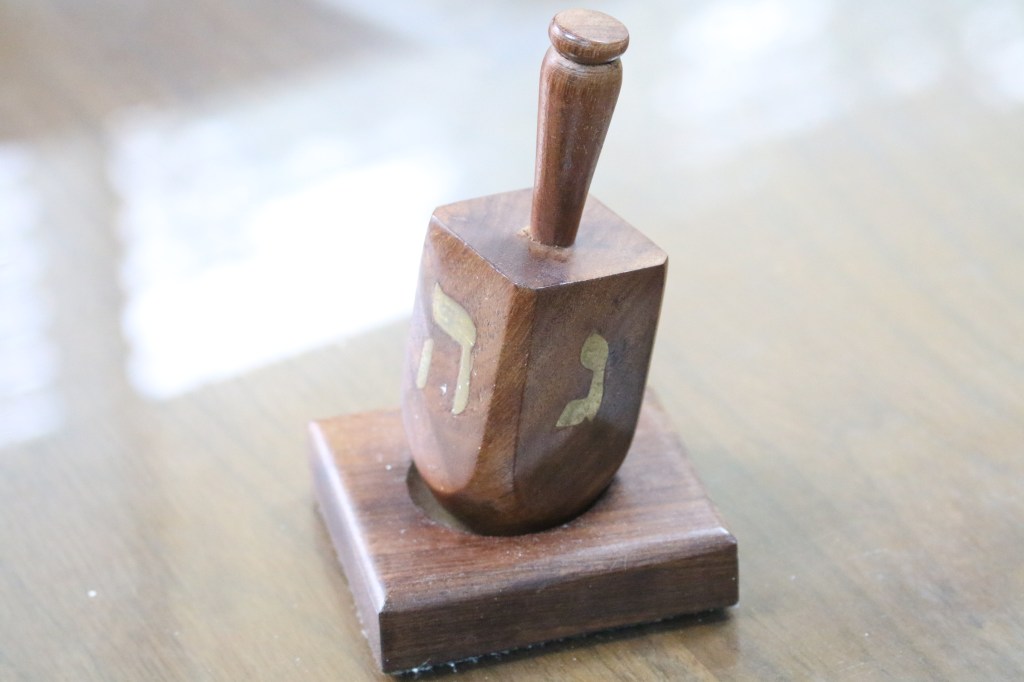Chanukah: Jewish tradition lights up the night
Published 10:00 am Saturday, December 1, 2018

- Amanda M. Usher | The Valdosta Daily TimesA dreidel is a traditional Chanukah child's game.
VALDOSTA — Chanukah is a spiritual journey and more than a holiday.
Rabbi Moshe Elbaz of Temple Israel said the Jewish holiday starts with a tale.
“It is the story of a little candle pushing away the monster of frightening darkness, of human sensibility overcoming terror and brutal force, of life and growth overcoming destruction,” he writes in article, titled, “The Festival of Lights.”
In 160 BCE, 2,200 years ago, a group known as the Maccabees fought for the autonomy of Jerusalem, Elbaz said.
The Greek-Assyrian army occupied Jerusalem and banned the practice of Judaism. Maccabee leader Matthias led a revolt, the rabbi said.
Elbaz said the revolt freed the City of Jerusalem and the temple from Greek rule.
The sanctuary and temple were rededicated to Jewish worship, Elbaz said.
Chanukah commemorates the victory.
The rabbi said he believes the holiday is a symbol of both military victory and religious freedom.
Temple Israel observes Chanukah, commonly spelled Hanukkah, Dec. 2-10.
The temple hosts Sabbath and Chanukah services 7 p.m., Dec. 7. A large menorah will be lit 6 p.m. each day of the observance during a short service, Elbaz said.
The menorah is an eight-branched candelabrum that burns oil, a primary centerpiece of the Jewish holiday.
When the Maccabees entered Jerusalem, they didn’t have any oil to light the menorah because the Greeks forbade Jewish practices, Elbaz said.
The rabbi said the miracle of Chanukah was a day’s worth of oil lasted for eight nights.
“The lights (on the menorah) represent hope that people who are oppressed can find their religious freedom wherever they are in the fight for it, and they hold true to it,” he said.
A blessing is recited as the menorah is lit at sunset: “Blessed are You, Lord our God, King of the universe, who sanctified us to kindle the Chanukah light.”
Traditional observances include candle lighting after sundown during the first day of Chanukah. A candle is lit each night during the holiday’s duration.
Families gather in their homes to eat Kosher foods, such as potato latkes, exchange gifts and sing songs.
Some of the songs regard lighting the menorah and a dreidel. A dreidel is a game with Hebrew letters used to interest and educate young children.
Elbaz said he believes the largest misconception of Chanukah is Jewish people isolate themselves and do not interact with others.
He said Temple Israel opens its synagogue to anyone, even if they do not know Hebrew.
“My mission here in Valdosta, the 16 years (I’ve been) here, is to open the doors to non-Jewish,” he said.
Elbaz has recently participated in an interfaith Thanksgiving service where a Valdosta-Lowndes County Habitat for Humanity home was dedicated.
Interfaith religion unites Christians, Muslims and the Jewish during a ceremony. Each religious leader has a role in the service. Elbaz gave the benediction.
Though he said he doesn’t believe in Christmas practices, he would attend a Christmas dinner.
“I may not have to eat their food, but I’ll attend to honor my guests and my host,” he said.
Elbaz asks the same for a non-Jewish person that visits his home.
“We’re living in a multicultural religious society,” he said. “We need to live together in peace.”


